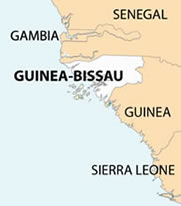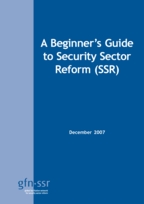SSR in Guinea-Bissau
Guinea-Bissau faces a number of challenges in its effort to create a modern, accountable and viable system of security and justice. The cycle of military coups and political unrest has been replaced with relative calm in recent years, but the main causes of the conflict remain unresolved.
The rule of law is critically undermined by drug trafficking; drug cartels take advantage of Guinea-Bissau’s porous borders and weak institutions to transit narcotics from Latin America to Western Europe. Reform within the security services is hampered by a lack of resolution regarding Guinea-Bissau’s ex-combatants, including former freedom fighters, and the inverted age pyramid in the military and police forces, which leaves limited openings for younger recruits.
A lack of budgetary management, basic training for the police, military and the judiciary and basic equipment, combined with the absence of organic laws for most security actors and institutions, further undermines state legitimacy and represents some of the crucial hurdles to be overcome.
Guinea-Bissau does have a framework to support its SSR process. Its SSR strategy, outlined in the ‘Reorganisation and Modernisation of the Defence and Security Sector Strategy Paper’, was finalised in October 2006 and was subsequently endorsed by the National Parliament. The Strategy establishes a two-level donor-government coordination structure, made up of the Steering Committee, with relevant Ministers and Ambassadors, and the Technical Coordination Committee (TCC); with similar cross-ministerial membership. The strategy also created a Permanent Secretariat to support the work of the committee structure.
The strategy outlines a number of key issues; including: a) resizing the defence and security sector to line up with the country’s needs and economic capacities; b) modernising the sector in line with its role; c) clarifying the status of former national freedom fighters; d) strengthening the participation of the sector in consolidating sub-regional security; e) building capacities and enhancing efficiency in the justice sector, f) mobilising national and international resources for investment in the sector; and g) involving civil society in the implementation of reform in the sector.
One particular gap is the need to develop a National Security Strategy, which could provide an over-arching vision for tackling the security challenges facing Guinea-Bissau. There remains also a challenge in translating the current strategy into tangible, visible changes in the lives of the population.
The lack of programmatic funding and the subsequent lack of visible outcomes is having a negative impact on levels of support and the general perception is that the reform has produced no dividends. While the international community has provided technical assistance to SSR, there needs to be a coordination effort, potentially via pooled funding to support the implementation of SSR priorities. Financial assistance, no matter how small, could make all the difference.
This summary is based on the findings from a recent mission to Guinea Bissau by a team from the International Security Sector Advisory Team (ISSAT). ISSAT is a multi-donor initiative, established at the Geneva Centre for the Democratic Control of the Armed Forces (DCAF), to assist bilateral and multilateral actors develop, design and implement SSR strategies, practices and programmes in line with international good practice. For more information, please visit our website at: www.dcaf.ch/issat
Useful links for Guinea-Bissau
- BBC Country profile: Guinea-Bissau
- UN News: Guinea-Bissau
- United Nations Peace-Building Support Office In Guinea-Bissau
- EU SSR Guinea-Bissau
- The International Security Sector Advisory Team (ISSAT)
- UNDP in Guinea Bissau (French)
GFN-SSR Document Library
The Document Library contains links to a number of SSR related documents either focussing specifically on SSR in Guinea-Bissau looking at the country alongside others as a case study. A selection of these are listed below:
- Background Paper on Security Sector Reform in Guinea-Bissau
How has security sector reform (SSR) proceeded in Guinea-Bissau, and what lessons can be done to move these efforts forward? This background paper, presented by the Peacebuilding Commission (PBC) Country-Specific Configuration on Guinea-Bissau, describes and analyses the current state of the defence, security and justice sectors. Reform efforts have affected the armed forces, the police and state security intelligence services, paramilitary forces, justice institutions, security management and oversight bodies, and non-statutory security forces. - Background Paper on Strengthening the Justice Sector in Guinea-Bissau
How successfully have recent reform plans strengthened the justice sector in Guinea-Bissau? This background paper, published by the Peacebuilding Commission (PBC) Country-Specific Configuration on Guinea-Bissau, analyses the efforts to create an independent judiciary and evaluates future challenges. With the sector unable to properly dispense justice, the average citizen of Guinea-Bissau today remains reliant on traditional justice mechanisms to resolve both interpersonal and community disputes. - Engaging Civil Society Organisations in Conflict-Affected and Fragile States: Three African Country Case Studies
Civil society organisations (CSOs), particularly non-governmental organisations (NGOs), play a prominent role in conflict-affected and fragile states. Yet there is poor understanding about CSOs and how to engage them more effectively. This World Bank working paper explores this issue using pilot assessment tools in Angola, Guinea Bissau and Togo. It argues that donors should move towards more sustained engagement with CSOs, focusing on institution building among CSO networks. - Guinea-Bissau: In need of a state
Why was democracy never successfully established in Guinea-Bissau’s post-colonial era? What obstacles has it encountered? This International Crisis Group report offers a brief but detailed outline of the history and development of Guinea-Bissau. Ethnic tensions and individual motives have played a crucial role in the struggle of Guinea-Bissau to become a functioning democratic country. The report reflects on what should be done in order to establish an efficient democratic state after four decades of failure. Problems lie both in the inexistence of a functioning institutional system, as well as the more explicit issues of drug trafficking and political instability. An effective institutional system needs to be established in order for Guinea-Bissau to progress from liberation to an efficient democracy. - Security Sector Governance: An Analysis of Guinea-Bissau
What is the status of security sector governance in Guinea-Bissau and what reforms are most urgently necessary? This article, published by the Conflict Research Unit at the Netherlands Institute of International Relations ‘Clingendael’, analyses the full spectrum of security sector institutions and actors in Guinea-Bissau. A flagrant disregard for the rule of law on the part of the executive and the security sector continues to lead to abuses. A pressing need for funding has meant that oversight capabilities, unable to leverage prestige, are consistently marginalised. - Security Sector Reform in Guinea-Bissau
What is needed for Guinea-Bissau to achieve its goals of Disarmament, Demobilisation and Reintegration (DDR) and Security Sector Reform (SSR)? This briefing report, published by Observatoire de l’Afrique, highlights promising circumstances for SSR in the country, as well as difficult challenges. As Guinea-Bissau’s most powerful actor, the armed forces must in effect reform themselves and take ownership of certain SSR efforts. In addition, the recent spurt of activity by international donors, and the plans to send foreign experts, must be followed up and effectively coordinated. - Towards a Common ECOWAS Agenda on Security Sector Reform
How can issues of donor incoherence and a lack of local ownership around security sector reform (SSR) be addressed in the Economic Community of West African States (ECOWAS)? This Geneva Centre for the Democratic Control of Armed Forces (DCAF) policy paper argues that a common ECOWAS agenda would help resolve such issues. It examines the rationale, opportunities and challenges of a common ECOWAS agenda and highlights the challenges and constraints a common agenda faces.










